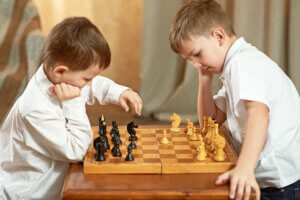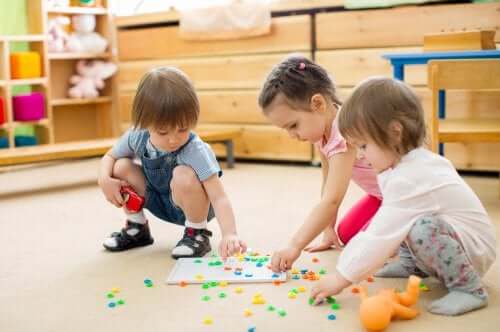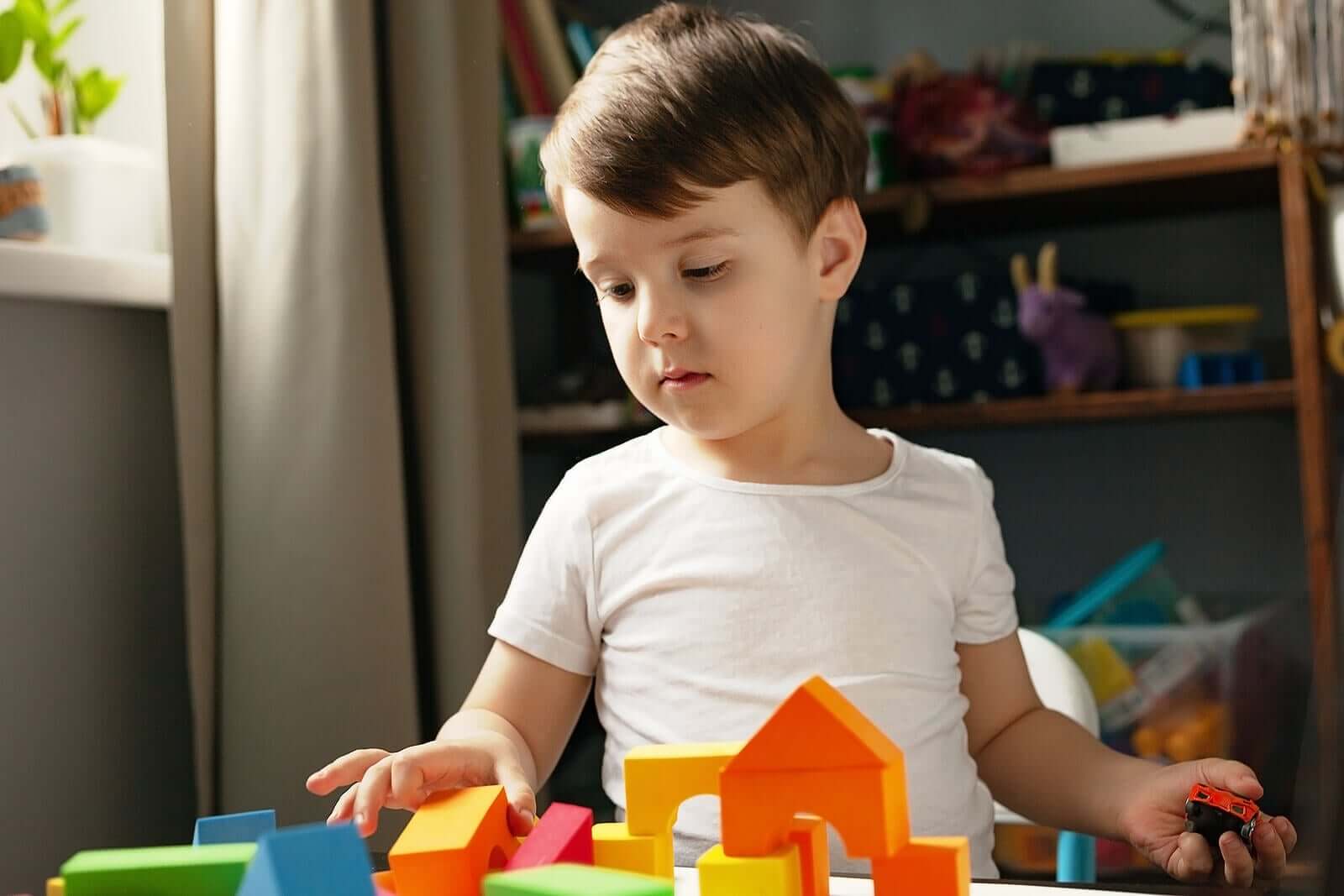6 Games that will Help Develop Deductive Reasoning

It’s very important that your child develops deductive reasoning early on. Both parents can help them work on this skill at home, and teachers can also play a role at school. To help parents with this task, we’re going to share six games that’ll help to develop deductive reasoning.
Logical thinking is necessary because it’ll help your child learn faster and have a greater understanding of any subject. In addition, it’ll help them solve obstacles and problems effectively throughout their lives.
Strong deductive reasoning skills translate into a greater ability to think properly. Do you want to know what games you can use to help develop deductive reasoning skills in your child? Keep reading.
Games that’ll help develop deductive reasoning

Imitations
By imitating the different sounds or movements of certain characters or animals, your child will develop the ability to associate things. In this game, they can also imitate the characters in their favorite cartoons, different animals or even someone in the family. In addition to improving their deductive reasoning skills, they won’t be able to stop laughing!
Puzzles to develop deductive reasoning
Puzzles are a great educational tool. Not only are they fun, but they can also help to improve your child’s deductive reasoning skills, as well as their attention. The good thing about puzzles is that there are so many options made for all different ages.
At the store, you can find puzzles for younger children, which are easier and only have a few pieces. On the other hand, you can also find more complicated ones, that have elaborate pictures and thousands of pieces. As your little one works on their puzzle, they’ll be building their attention and concentration abilities.
Chess is another game that’ll help develop deductive reasoning
This is one of the best games to help develop deductive reasoning because it’s most closely linked to this skill. When children play chess, they’re working on their ability to think and they’re also improving their memory, concentration, responsive actions and their ability to problem solve.
Therefore, you should definitely play chess at home with your children. In addition to having fun, you’ll help them improve their deductive reasoning.
Scrabble
You can play this game with children who already know how to read and write. As they play, they’ll start improving the speed at which they reason, their automatic thinking, and their vocabulary.
In addition, you can also use Scrabble to help your children learn new words and to help improve their spelling. These types of games help children think faster, to concentrate and make learning easier.
Patterns to develop deductive reasoning
Learning about patterns is a very easy technique that’ll help children improve their ability to associate and sort. They can sort using different colored stickers and shapes, objects or sizes. The key is to use materials that have something in common.

For example, you can put some different colored bowls on the table. Then, you can give your child different colored pieces of paper of pompoms that are the same color as the bowls. Your child will then work to put each item in the bowl with the same color.
Another thing you could do is use the stickers and start sorting them according to their sizes and colors. Then, your child has to continue to follow the pattern the same way that you started it. This activity will help them improve their deductive reasoning and association skills.
Copy the image to develop deductive reasoning
This is another game that’ll help develop deductive reasoning skills in your children. You can purchase this game at the store or you can make your own version at home. The store-bought version comes with some colored pieces that your child will place according to a sheet with an image on it.
However, if you want to do it yourself at home you can draw a picture on a piece of cardboard, then have your child re-create it using LEGO pieces. This game will help your child develop spatial awareness of their bodies as well as logic. That’s because they’ll need to follow what the drawing shows in order to place their LEGO pieces.
Conclusion
These games for deductive reasoning are a great way to entertain your child while also helping to improve their cognitive abilities. For example, they’ll be building on their reasoning, orientation, attention and concentration skills. So, if your kids are bored, it’s time to start playing!
It’s very important that your child develops deductive reasoning early on. Both parents can help them work on this skill at home, and teachers can also play a role at school. To help parents with this task, we’re going to share six games that’ll help to develop deductive reasoning.
Logical thinking is necessary because it’ll help your child learn faster and have a greater understanding of any subject. In addition, it’ll help them solve obstacles and problems effectively throughout their lives.
Strong deductive reasoning skills translate into a greater ability to think properly. Do you want to know what games you can use to help develop deductive reasoning skills in your child? Keep reading.
Games that’ll help develop deductive reasoning

Imitations
By imitating the different sounds or movements of certain characters or animals, your child will develop the ability to associate things. In this game, they can also imitate the characters in their favorite cartoons, different animals or even someone in the family. In addition to improving their deductive reasoning skills, they won’t be able to stop laughing!
Puzzles to develop deductive reasoning
Puzzles are a great educational tool. Not only are they fun, but they can also help to improve your child’s deductive reasoning skills, as well as their attention. The good thing about puzzles is that there are so many options made for all different ages.
At the store, you can find puzzles for younger children, which are easier and only have a few pieces. On the other hand, you can also find more complicated ones, that have elaborate pictures and thousands of pieces. As your little one works on their puzzle, they’ll be building their attention and concentration abilities.
Chess is another game that’ll help develop deductive reasoning
This is one of the best games to help develop deductive reasoning because it’s most closely linked to this skill. When children play chess, they’re working on their ability to think and they’re also improving their memory, concentration, responsive actions and their ability to problem solve.
Therefore, you should definitely play chess at home with your children. In addition to having fun, you’ll help them improve their deductive reasoning.
Scrabble
You can play this game with children who already know how to read and write. As they play, they’ll start improving the speed at which they reason, their automatic thinking, and their vocabulary.
In addition, you can also use Scrabble to help your children learn new words and to help improve their spelling. These types of games help children think faster, to concentrate and make learning easier.
Patterns to develop deductive reasoning
Learning about patterns is a very easy technique that’ll help children improve their ability to associate and sort. They can sort using different colored stickers and shapes, objects or sizes. The key is to use materials that have something in common.

For example, you can put some different colored bowls on the table. Then, you can give your child different colored pieces of paper of pompoms that are the same color as the bowls. Your child will then work to put each item in the bowl with the same color.
Another thing you could do is use the stickers and start sorting them according to their sizes and colors. Then, your child has to continue to follow the pattern the same way that you started it. This activity will help them improve their deductive reasoning and association skills.
Copy the image to develop deductive reasoning
This is another game that’ll help develop deductive reasoning skills in your children. You can purchase this game at the store or you can make your own version at home. The store-bought version comes with some colored pieces that your child will place according to a sheet with an image on it.
However, if you want to do it yourself at home you can draw a picture on a piece of cardboard, then have your child re-create it using LEGO pieces. This game will help your child develop spatial awareness of their bodies as well as logic. That’s because they’ll need to follow what the drawing shows in order to place their LEGO pieces.
Conclusion
These games for deductive reasoning are a great way to entertain your child while also helping to improve their cognitive abilities. For example, they’ll be building on their reasoning, orientation, attention and concentration skills. So, if your kids are bored, it’s time to start playing!
All cited sources were thoroughly reviewed by our team to ensure their quality, reliability, currency, and validity. The bibliography of this article was considered reliable and of academic or scientific accuracy.
- Carreón-C., D. P. (2022). Habilidades del pensamiento para el aprendizaje. Con-Ciencia Boletín Científico de la Escuela Preparatoria No. 3, 9(18), 139-142. https://repository.uaeh.edu.mx/revistas/index.php/prepa3/article/view/9511
- Cornellà, P., Estebanell, M., & Brusi, D. (2020). Gamificación y aprendizaje basado en juegos. Enseñanza de las Ciencias de la Tierra, 28(1), 5-19. https://www.raco.cat/index.php/ECT/article/view/372920
- Galdo J., A. J. (2021). El razonamiento deductivo, inductivo y abductivo: diferencias e integración desde ejemplos empresariales. Phainomenon e-2708-5023 Vol 20 N°2. https://repositorio.ulima.edu.pe/handle/20.500.12724/15290
- Sandoval, Á. L. G., & Sandoval, Ó. E. G. (2023). El ajedrez en el desarrollo cognitivo. FILHA, 18(28), 1-30. https://revistas.uaz.edu.mx/index.php/filha/article/view/2037
This text is provided for informational purposes only and does not replace consultation with a professional. If in doubt, consult your specialist.








